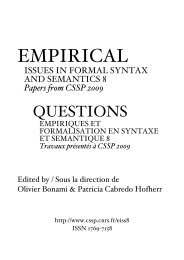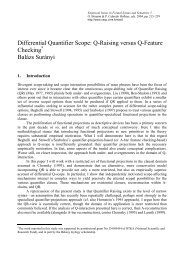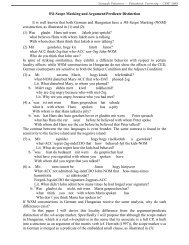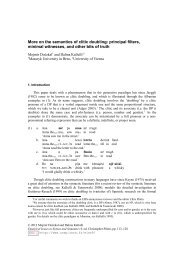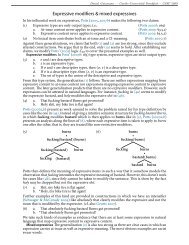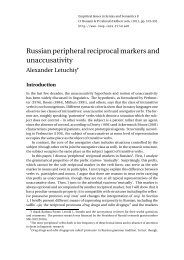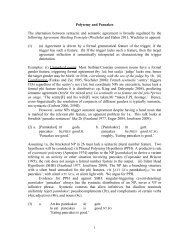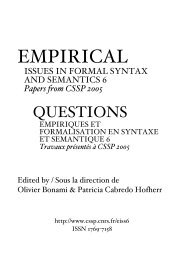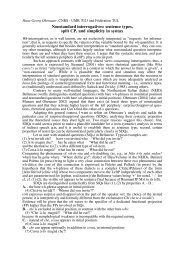Empirical Issues in Syntax and Semantics 9 (EISS 9 ... - CSSP - CNRS
Empirical Issues in Syntax and Semantics 9 (EISS 9 ... - CSSP - CNRS
Empirical Issues in Syntax and Semantics 9 (EISS 9 ... - CSSP - CNRS
Create successful ePaper yourself
Turn your PDF publications into a flip-book with our unique Google optimized e-Paper software.
semantics of these constructions has been much less prolific. This is <strong>in</strong> part due to the<br />
perplex<strong>in</strong>g fact that while dative clitic doubl<strong>in</strong>g (i.e. clitic doubl<strong>in</strong>g of dative objects) behaves<br />
analogous to object agreement mark<strong>in</strong>g (e.g. see Sportiche 1996 <strong>and</strong> references there<strong>in</strong>), clitic<br />
doubl<strong>in</strong>g of direct object DPs seems to be subject to various idiosyncratic language-specific<br />
semantic constra<strong>in</strong>ts, such as animacy <strong>and</strong> specificity <strong>in</strong> Romanian <strong>and</strong> Spanish (Farkas 1978,<br />
Suñer 1988, Dobrovie-Sor<strong>in</strong> 1990), def<strong>in</strong>iteness <strong>in</strong> Modern Greek (Anagnostopoulou 1994a,b,<br />
Anagnostopoulou & Giannakidou 1995), topichood <strong>and</strong>/or givenness <strong>in</strong> Albanian (Kallulli<br />
2000, 2008), which make it very hard if not altogether impossible to come up with a unitary<br />
semantic analysis. 3<br />
In this paper, we present novel data from Albanian show<strong>in</strong>g that (i) the DP associated with<br />
the clitic (i.e. the ‘doubled’ DP) must be <strong>in</strong>terpreted as generat<strong>in</strong>g admissible m<strong>in</strong>imal<br />
witnesses, which <strong>in</strong> turn makes the DP topical; <strong>and</strong> that (ii) as a consequence of (i), clitic<br />
doubl<strong>in</strong>g systematically produces <strong>in</strong>formation structure effects <strong>in</strong> that the doubled DP is<br />
unequivocally <strong>in</strong>terpreted as topical.<br />
This paper is organized as follows. In §2, we present the core data, which among other<br />
th<strong>in</strong>gs necessitate the search for an alternative analysis to the one proposed <strong>in</strong> Gutiérrez-Rexach<br />
1999. In particular, we draw attention to the fact that, contrary to what Gutiérrez-Rexach<br />
claims, clitic doubl<strong>in</strong>g cannot be expla<strong>in</strong>ed by appeal<strong>in</strong>g to the notion of pr<strong>in</strong>cipal filterhood. §3<br />
then details our own analysis, the crux of which is that the clitic doubled DP must be <strong>in</strong>terpreted<br />
as generat<strong>in</strong>g an admissible m<strong>in</strong>imal witness, from which all other effects such as those<br />
<strong>in</strong>volv<strong>in</strong>g <strong>in</strong>formation structure are derived.<br />
2. Determ<strong>in</strong>er types <strong>and</strong> clitic doubl<strong>in</strong>g: the view from Albanian<br />
2.1. Strong <strong>and</strong> weak determ<strong>in</strong>ers<br />
On the basis of their formal properties, Barwise <strong>and</strong> Cooper (1981:182) dist<strong>in</strong>guish<br />
between two classes of quantifiers, namely, ‘strong’ <strong>and</strong> ‘weak’ ones. Strong quantifiers are<br />
those headed by the ‘strong’ determ<strong>in</strong>ers <strong>in</strong> (2a), <strong>and</strong> weak quantifiers are those headed by the<br />
‘weak’ determ<strong>in</strong>ers <strong>in</strong> (2b).<br />
(2) a. strong determ<strong>in</strong>ers: the, both, all, every, each, most, neither<br />
b. weak determ<strong>in</strong>ers: a, some, one, two, three, …, many, a few, few, no, ∅<br />
In Albanian, DPs headed by strong determ<strong>in</strong>ers can be clitic doubled; we already saw an<br />
<strong>in</strong>stance of this <strong>in</strong> (1b). Two further examples of doubl<strong>in</strong>g with strong quantifiers are given <strong>in</strong><br />
(3). 4<br />
(3) a. (I) lexova të dy librat.<br />
them Cl.ACC read.1s agr both books.the ACC<br />
‘I read both books.’<br />
b. (I) lexova të gjithë librat.<br />
them Cl.ACC read.1s agr all books.the ACC<br />
‘I read all (the) books.’<br />
3<br />
However, some of these claims are controversial. For <strong>in</strong>stance, the Greek example <strong>in</strong> (18b) <strong>in</strong> §2.3 shows<br />
that <strong>in</strong>def<strong>in</strong>ites can clearly be clitic doubled <strong>in</strong> this language, a fact that has been acknowledged as a<br />
counterexample by Anagnostopoulou (1994b:4) herself.<br />
4<br />
DPs headed by the strong determ<strong>in</strong>ers every, each, most, <strong>and</strong> neither may also be clitic doubled <strong>in</strong><br />
Albanian. However, we postpone their discussion to §3.2.<br />
114



